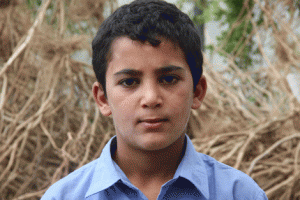Mohammed’s plea: “No more shooting or bombs in Gaza”
We’ve only been in Gaza a few days, and we’ve heard more stories about death, destruction and the suffering of innocent children than you’d want to hear in a lifetime.
We spent a day filming with 12-year-old Mohammed and his family in Al Atatra, a rural area in the north of the Gaza Strip. The idea was to catch up with Mohammed one year after he was first filmed for Save the Children during what they call “el harb” (the war), otherwise known as the Israeli military offensive Operation “Cast Lead.”
Back then, Mohammed and his family were living in a school turned temporarily into a shelter for those whose houses were in the line of fire. And Mohammed’s family lived in a 4×5 metre classroom alongside another 50-60 men, women and children. In that first report, Mohammed was visibly shaken by the whole experience and said he wasn’t able to sleep.
Twelve months on, the whole family are now back in their own house. When they first returned, his father said they couldn’t even recognise their own street, the destruction was so bad. They were relieved to find their home still standing (many were not), albeit heavily damaged by shelling and peppered with bullet holes.
Mohammed told us how his home, which had been occupied by Israeli soldiers, was covered in broken glass and furniture. Their clothes had been ripped up, and there was dog-shit all over the place.
The list of destruction is endless. Other low-lights include the TV and computer that Mohammed used to play on, and almost everything on his father’s small piece of farmland, including olive trees, crops of spinach, potatoes, strawberries, sage, thyme, and hundreds of honey-producing bees that were killed-off by dropping internationally outlawed white phosphorus. His 21 sheep had also been left for dead. “What did they do?” his father asked.
I found Mohammed to be the sweetest, most sensitive 12-year-old boy you could meet. He initially sat a little nervously eating his breakfast with his cousin on the kitchen floor (no furniture, remember), but like most children we have met here he soon began to began to talk and recalled with frightening clarity the nightmare of the war. He told us he still doesn’t sleep well and his father says that at night, if he’s thirsty, he’s too scared to go to the next room to fetch a glass of water.
Buildings are reduced to rubble all over Gaza. Not just (Hamas) government offices but ordinary homes and many schools too. No wonder Mohammed cannot sleep. He constantly worries that the soldiers will come back. The problem is that his worry is not without foundation. Operation Cast Lead was not a unique event, but rather part of a cyclical pattern of violence against Gaza’s children.
It’s tough to be optimistic having heard so many horrifying stories, but at least Mohammed holds on to some hope…
“I wish that both sides can come together in peace, and there will be no more shooting, or aeroplanes, or bombs, or anything.”
Here here, Mohammed.


Share this article